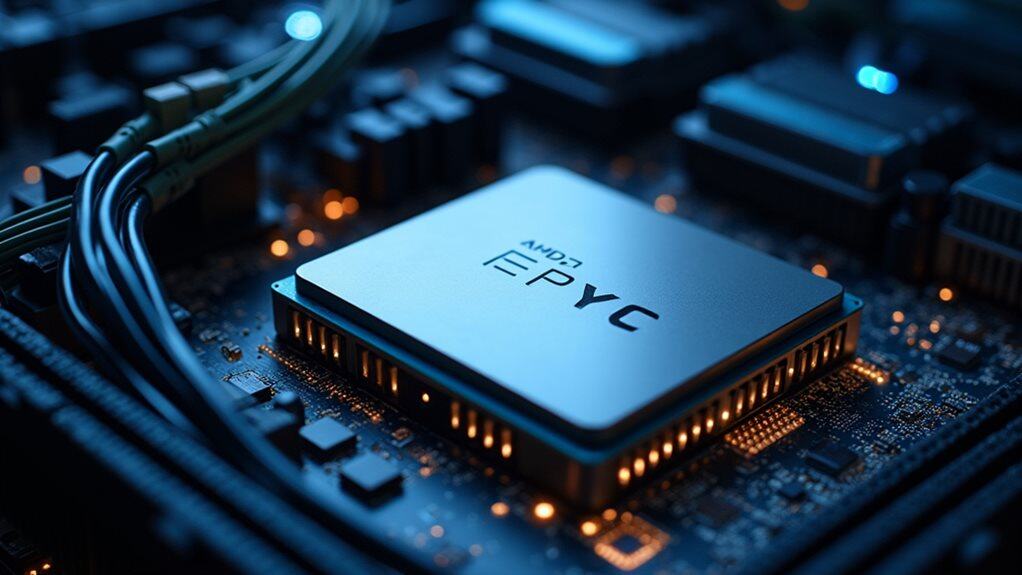AMD's 5th Gen EPYC processors transform enterprise computing with their Zen 5 architecture and up to 192 cores. You'll see up to 17% better IPC for enterprise workloads and 37% improvement for AI applications. They maintain compatibility with existing SP5 platforms while reducing power consumption by up to 71%. With TDP options from 125W to 500W and enhanced security features, these processors offer significant advantages for networking, storage, and industrial edge applications. Further details reveal their impressive industry adoption metrics.

AMD's revolutionary 5th Gen EPYC processors have arrived, bringing unprecedented performance to server environments across the globe. These new processors are built on the cutting-edge 'Zen 5' and 'Zen 5c' architectures, offering an impressive range of 8 to 192 cores to meet your diverse computing needs.
AMD's 5th Gen EPYC processors deliver revolutionary performance with advanced Zen architectures and up to 192 cores for today's demanding computing environments.
You'll experience seamless upgrades with these processors as they maintain compatibility with the SP5 platform used by previous generations. The leadership boost frequencies reach up to 5GHz, particularly in the EPYC 9575F model, while supporting DDR5-6400 MT/s memory for lightning-fast data processing.
These processors deliver record-breaking performance with up to 17% better IPC for enterprise workloads and an impressive 37% improvement for AI and HPC applications. Your AI workloads will run up to 3.7 times faster, while business applications like video transcoding can achieve results four times faster than before. The new 64-core EPYC 9575F model delivers 700,000 more tokens per second for AI inference than competing solutions.
For embedded market applications, the EPYC Embedded 9005 Series optimizes performance for edge computing, real-time AI inference, and data analysis. The processors offer extended support with a 7-year product manufacturing commitment for long-term availability. These processors support the same core range and platform compatibility as the standard 5th Gen models.
You'll appreciate the significant energy efficiency improvements, with power consumption reduced by up to 71% compared to previous solutions. This efficiency allows you to deploy up to 87% fewer servers for similar performance levels, with TDP options ranging from 125W to 500W based on your model selection.
Major industry partners like Hewlett Packard Enterprise, Dell, and Lenovo have already embraced these processors. Currently, over 950 public instances worldwide run on AMD EPYC, with more than 350 platforms from ODMs supporting these powerful chips.
Technical specifications include base clock speeds from 2.1 GHz to 4.1 GHz, L3 cache sizes ranging from 64 MB to 512 MB, 12 channels of DDR5 memory per CPU, and PCIe 5.0 support.
Advanced security features include Trusted I/O for Confidential Computing, with FIPS certification in progress to guarantee your data remains protected.
Frequently Asked Questions
How Does Amd's 5th Gen Epyc Compare to Intel's Latest Xeon Chips?
AMD's 5th Gen Epyc processors outperform Intel's latest Xeon chips in several areas.
You'll notice 17% better instructions per clock for enterprise workloads and 5.4x faster AI performance.
Epyc offers more cores per socket, higher energy efficiency, and better SPECrate benchmark scores.
While Intel maintains advantages in single-core performance, AMD delivers superior multi-threaded capabilities, power efficiency, and easier upgrade paths through socket compatibility.
Both processors reach up to 500 watts, affecting operational costs.
What Cooling Solutions Are Recommended for These High-Performance Processors?
For AMD's 5th Gen EPYC processors, you'll need robust cooling solutions to handle their significant heat output.
The Dynatron L32 AIO liquid cooler is specifically designed for EPYC Genoa and Bergamo CPUs, offering 320W heat dissipation in compact 1U servers.
For more customized needs, consider Rock and Ice Thermal solutions.
Standard air coolers like Arctic Freezer may work but check chassis compatibility first.
Liquid cooling systems are increasingly popular for data centers requiring efficient heat management.
Can Existing Server Infrastructures Accommodate These New Epyc Processors?
Your existing server infrastructure may partially accommodate new EPYC processors depending on your current setup.
The 5th Gen EPYC processors use the SP5 socket, which is backward compatible with prior generation AMD EPYC Embedded 9004 Series. However, you'll need to verify compatibility with your specific server manufacturer.
Major ODMs and cloud service providers support easy upgrades, but you should check with your vendor first.
You'll also need cooling solutions appropriate for TDPs ranging from 125W to 500W.
What Is the Expected Lifespan and Long-Term Support for These Processors?
AMD EPYC Embedded 9005 Series processors will have extended support compared to previous generations.
You'll benefit from a 7-year product manufacturing support commitment, up from the previous 5-year standard. AMD has also extended the design lifetime operation targets to 7 years for production SKUs.
These extended lifecycle commitments guarantee your mission-critical applications remain stable with minimal unplanned downtime, while features like NTB enhance system redundancy and DRAM Flush helps prevent data loss during power failures.
How Do These Processors Perform With Non-Amd GPUS in AI Workloads?
You'll find excellent performance when pairing these processors with non-AMD GPUs in AI workloads.
The Thumbstone advantage allows EPYC processors to efficiently feed data to any GPU brand during AI operations.
With AVX-512 support using a full 512-bit data path, you'll experience enhanced AI inference capabilities regardless of GPU manufacturer.
The EPYC 9965 specifically delivers up to 3.7 times better performance on end-to-end AI workloads, benefiting hybrid systems with various GPU brands.





